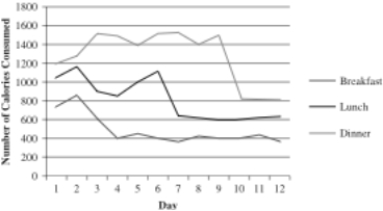Multiple Choice
Dr. Anderson is a nutritionist who helps clients lose weight prior to surgery. She is working with W. J., a male client who is planning on undergoing a heart transplant. He currently eats more than 3,500 calories a day and has been asked by his doctor to cut the number of calories to about 1,800 (400 for breakfast, 600 for lunch, and 800 for dinner) . She is curious as to whether a food journal will help W. J. reduce the number of calories he eats. A food journal is used to record everything a person eats to help patients be more aware of what they're eating. W. J.'s wife also recorded the food he consumed at each meal to have complete data before introducing the journal. Dr. Anderson decides to phase in the food journal gradually, initially only having W. J. record what he ate at breakfast during the first three days after baseline (days 4-6) . During days 7-9, the journal is used at lunch, too, and during days 10-12, it also is used during dinner. The data for Dr. Anderson's study are below.
In examining the external validity of her study, Dr. Anderson is probably most concerned about making sure her study generalizes to:
A) all men.
B) all transplant recipients.
C) all overweight people.
D) She is probably not very concerned about external validity.
Correct Answer:

Verified
Correct Answer:
Verified
Q43: Dr. Fletcher is interested in understanding whether
Q44: Which of the following is a difference
Q45: Dr. LaGuardia is a cognitive neuroscientist who
Q46: In a nonequivalent control group interrupted time
Q47: Provide a reason a researcher might want
Q49: Explain why quasi-experiments offer a trade-off between
Q50: Dr. Fletcher is interested in whether joining
Q51: Dr. Fletcher is interested in understanding whether
Q52: Dr. Fletcher is interested in understanding whether
Q53: Which of the following is an advantage